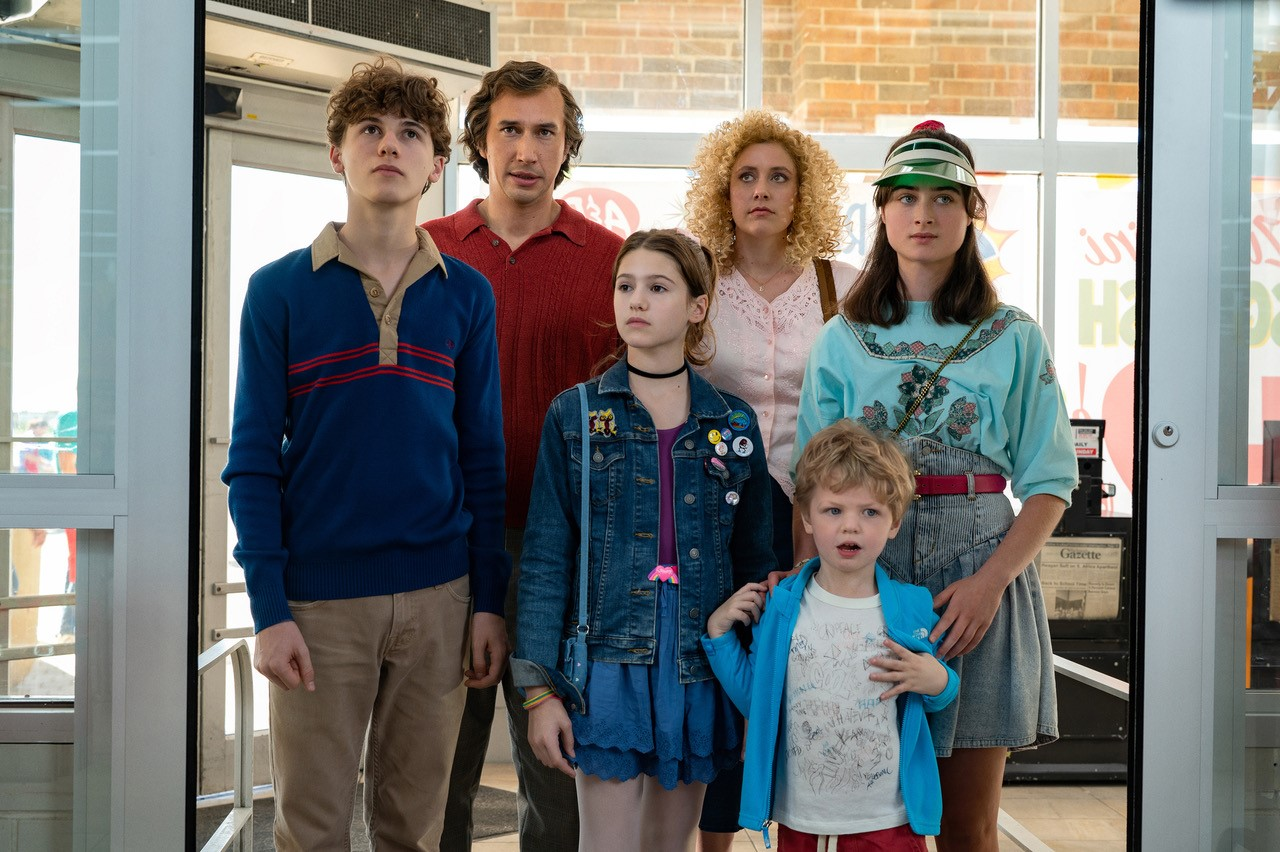White Noise: Clunky if Heartfelt Adaptation Trips on Narrative Hurdles
By Karen Gordon
Rating: C+
Generally speaking, writer-director Noah Baumbach makes movies that are intelligent, aware, and wry with very verbal lead characters struggling with aspect of modern life, which in turn is often them struggling with their own neurosis. They’re entertaining movies, but also tap into currents that are universal.
As such, you can see why Baumbach would be attracted to the idea of turning Don Delillo’s award-winning book White Noise — largely considered unfilmable — into a movie.
Built around a university professor, his wife and their blended family, the book is a sharply drawn, darkly comic satire of American life with some disturbing overtimes. Set in the mid-80s Regan era amid the hardening of the American right, it covers things like conspiracy theories, misinformation, and knee-jerk anti-government sentiment in the face of a disaster. Despite its period setting, it resonates with what’s going on right now.
Existential angst and ironic humour, family tensions, observations about academia, middle class and a deadly fear of death hover over Baumbach’s adaptation. This is his wheelhouse.
The film centres around Jack Gladney, played by Adam Driver with a pleasantly flabby dad body. He’s a professor at college on the hill in a midwestern town whose claim to fame is that he founded a Hitler studies course that put his university on the map, and should assure his position.
Still, he’s not completely confident or at peace with himself. He tends to wear a formal college robe over his clothes at the university whether he’s lecturing or not. At lunch he’s hunched over the cafeteria table locked in competitive debates about all kinds of issues with a group of professors, all male. (None except him wearing their robes). Those profs include Murray Siskind (Don Cheadle), who wants to set up an Elvis Studies course with Gladney’s guidance.
Even when the two spend personal time together — shopping at the local A&P, for instance — their conversation is always academia on steroids.
Gladney is happily married for the fourth time to the sunny, frizzy-haired Babbette (Greta Gerwig). The two have a blended family of four children between them: two teens, a tween, and a rambunctious preschooler named Wilder, who is theirs.
Teens Denise (Rafferty Cassidy) and Heinrich (Sam Nivola) keep up a steady stream of deadpan commentary, generally focusing on criticism of their parents’ habits or concerns about societal norms or issues.
The house is lively with conversation, but people are mostly talking and not listening to each other. Jack and Babbette talk over the kids about the normal things parents do, and then sneak off to their bedroom before dinner, where conversation about pleasing each other leads to more conversation. And that’s about it.
Their comfortable lives change, briefly, when a train disaster releases a toxic cloud of some kind, “the toxic airborne event” as the movie calls it, and the residents are evacuated to a makeshift centre to wait until the powers that be can figure things out.
At the centre, government information and media coverage of the event are disbelieved by some, including Jack. Some evacuees spin conspiracy theories that breed their own conspiracy theories repeated with full passion and conviction. As well, Jack is casually told by one of the organizers working away at a computer that he’s been exposed to a substance that will kill him. Eventually.
Although the information is vague, it taps into a major source of his angst, one that he shares with Babbette: a crippling fear of death.
That launches the final part of the movie, which brings us back to the family, involves an experimental, obscure drug named Dylar and a research project run out of a seedy motel by a weird guy named Arlo Shell, played by the wonderful Lars Eidinger.
Chaos, of a sort, ensues, kind of like comic film noir. And then a surprising finish, a giant musical number set in the local A&P.
I am a Baumbach fan. He makes such smart, thoughtful movies. He’s tuned into behaviour, particularly neurotic behaviour, and the way even really smart people can overthink themselves into problems, even while trying to set themselves free from those things.
Few filmmakers can give us characters who are problematic, sometimes even irritating, and yet, loveable and unforgettable. And there’s a sweetness to his work. He’s a wonderful writer as well, and twice nominated for Oscars for screenwriting, for 2005’s The Squid and the Whale, and most recently for 2019’s near-perfect Marriage Story.
But taking on White Noise is a major challenge for any filmmaker, especially one who obviously wanted to honour the book. Baumbach, aiming to be true to the source material, uses DeLillo’s distinctive approach to dialogue, which is meant to be read, not spoken. It’s understandable, but a choice that has given his fine cast a lot of challenges in making the conversation compelling. The dialogue gets tiring and leaden.
The style of the language of the book means that the talkiness that is usually so appealing in a Baumbach film weighs the movie down. There are a lot of ideas and conflicts and questions — even joy and love — which is no surprise considering this is DeLillo through the lens of Baumbach. But it never quite finds its rhythm.
The ideas are there. You can see why Baumbach would take this on. In the end, what we’re left feels like more of a sincere and heartfelt attempt than a successful movie.
White Noise. Written and directed by Noah Baumbach. Starring Adam Driver, Greta Gerwig, and Don Cheadle. In theatres, December 2 and on Netflix December 30.



